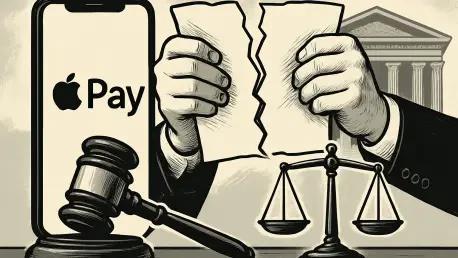In the rapidly evolving world of digital payments, a startling accusation has emerged, casting a shadow over one of the industry’s biggest players, Apple. A recent lawsuit filed in the Northern District of Georgia, Atlanta Division, claims that the tech giant behind the widely used Apple Pay service built its mobile wallet technology on stolen intellectual property. This legal challenge, brought forth by Fintiv, a company with a global footprint in digital payment solutions across more than 35 countries, alleges a calculated misuse of confidential information. The case raises profound questions about corporate ethics and the protection of innovation in an era where technology drives economic success. As mobile payments continue to reshape how transactions are conducted worldwide, this dispute could set a precedent for how proprietary technology is safeguarded, spotlighting the delicate balance between collaboration and competition in the tech sector.
Unpacking the Legal Allegations
Origins of the Dispute
The roots of this legal battle trace back to discussions between Apple and Fintiv’s predecessor, CorFire, over a decade ago. According to the lawsuit, these talks, held under strict non-disclosure agreements, were intended to explore a potential licensing deal for mobile wallet technology. However, the complaint asserts that Apple misused the shared confidential data to develop Apple Pay, which launched several years later. Fintiv claims this act of misappropriation not only violated trust but also allowed Apple to gain a significant foothold in the digital payment market. The allegations paint a troubling picture of a tech titan allegedly exploiting smaller innovators to fuel its own growth. Beyond the immediate parties involved, this case underscores a critical issue in the industry: the vulnerability of proprietary information during partnership negotiations. If proven, these claims could prompt stricter safeguards for smaller companies engaging with larger corporations, reshaping how such collaborations are approached in the technology landscape.
Scope of the Alleged Misconduct
Delving deeper into the accusations, the lawsuit details how the purportedly stolen technology became integral to Apple’s ecosystem, embedded across a range of products like iPhones, iPads, Apple Watches, and MacBooks. Fintiv argues that this integration has generated immense revenue from hundreds of millions of devices sold globally, amplifying the scale of the alleged theft. Furthermore, partnerships with banks and payment networks to facilitate Apple Pay transactions are cited as evidence of Apple profiting extensively from the disputed technology. The complaint suggests a deliberate strategy to adapt and expand the use of this technology across multiple platforms, maximizing financial gain. This widespread application raises questions about accountability when intellectual property is allegedly misused on such a massive scale. The implications extend beyond financial damages, potentially affecting consumer trust in how tech giants handle proprietary innovations sourced from external collaborators.
Broader Implications for the Tech Industry
Patterns of Corporate Behavior
This lawsuit is not an isolated incident but rather part of a growing tension between technology behemoths and smaller innovators over intellectual property rights. The narrative presented by Fintiv highlights a recurring concern that large corporations may leverage their vast resources to gain unfair advantages, often sidelining the original creators of groundbreaking technologies. Such actions, if substantiated, could stifle innovation by discouraging smaller firms from sharing ideas or entering into partnerships with industry leaders. The case also draws attention to a separate, recently dismissed legal action involving Apple, Visa, and Mastercard, which hinted at questionable business practices in the payment sector, though it is not the focus here. This broader context suggests a pattern of scrutiny over how dominant players navigate competitive landscapes. The outcome of this dispute may influence future policies on protecting intellectual property, ensuring that innovation is rewarded rather than exploited in the tech ecosystem.
Future of Intellectual Property Protection
Reflecting on the potential ramifications, this legal challenge underscores the urgent need for stronger mechanisms to protect intellectual property in the tech industry. As digital payment solutions continue to evolve, the risk of misuse of confidential information during collaborative efforts remains a pressing concern. The allegations against Apple, if proven, might catalyze reforms in how non-disclosure agreements are enforced and how partnerships are structured to prevent exploitation. Industry stakeholders may push for more transparent frameworks to ensure that smaller innovators are not disadvantaged when working with larger entities. Additionally, this case could inspire other companies to pursue legal action if they believe their technologies have been misappropriated, potentially leading to a wave of litigation over the next few years. Looking back, the initiation of this lawsuit marked a pivotal moment, prompting discussions on balancing competitive advantage with ethical responsibility in technology development. Moving forward, the focus should be on establishing robust safeguards and fostering an environment where innovation thrives without fear of betrayal.









